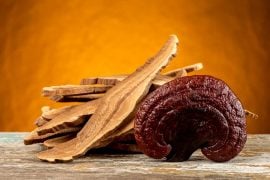Mushrooms are having a moment. Yes, chances are that you have been eating mushrooms your whole life. Whether on a pizza, in a salad, or pan-seared with a little garlic and olive oil (one of our favorites.) But something different is happening with mushrooms now. Other cultures have viewed various types of fungi to have functional or medicinal properties that go beyond adding flavor to a pizza. Why? Well, a lesser-known fiber called beta-glucans is one of the reasons that certain mushrooms fall in the “medicinal” category.
Korean, Eastern Russian, Chinese and Japanese cultures have all used mushrooms that contain beta-glucans as an alternative medicine. And according to some relatively new researcher in the West, there is some evidence to back it up. It seems that this little fiber can potentially help prevent some diseases and provide some additional health benefits. We always knew fiber is good for you, but what makes this little fiber special? Well, for starters it appears to boost your immune system and provide some anti-inflammatory properties as well.
But it’s not all perfect, as there can be some risks and downsides as well. So are they right for you? Let’s dig in!
Product Review: Real Mushrooms 5 Defenders Organic Mushroom Blend Capsules
What Exactly Are Beta-Glucans?
In short, beta glucans are dietary fibers. And you can find them in their highest concentrations in certain mushrooms, as well as oats, barley and baker’s yeast.
The health effect observed depends on the specific dietary source of the beta-glucan. This difference is likely due to structural differences found in the different sources of beta-glucans. But it appears that beta-glucans found in mushrooms have the biggest effect on the immune system. (That’s not to say that beta-glucans found in oats and barley aren’t beneficial, but they’re just beneficial in a different way.)
Also Read: These are the 6 best foods for balancing hormones
Mushroom-based beta-glucans appear to stimulate the immune system, which consequently offering the body increased protection against disease and infection.
Which Types of Mushrooms have the most Beta-Glucans?
The edible mushrooms that contain the most beta-glucans include
- oyster
- maitake
- reishi
- shiitake
Also Read: 5 Chaga Mushroom benefits, according to Science
Potential Benefits of Beta Glucans
1. Anti-inflammatory
Ideally, inflammation only occurs as a response to infections and irritation in the body. But the body will sometimes experience chronic inflammation. And we often associate chronic inflammation with various chronic illnesses. And a few studies have shown that beta-glucans have beneficial effects on conditions like inflammatory bowel disease (IBD).
In 2009 there was a clinical study to look at the effect of a beta-glucan mushroom extract. The participants of the study consumed 60 mL of beta-glucan rich mushroom extract for 12 days. After those 12 days the participants showed a reduction of inflammatory markers in their bloodstream. We always need more than one study to draw any conclusions, but these results are promising.
Additionally, study participants who had inflammatory bowel disease (IBD) and consumed the extract for 12 days showed reduced pro-inflammatory cells. The mechanism behind this potential anti-inflammatory effect is still unknown to researchers due to limited studies on this topic.
Also Read: The 5 Best medicinal mushrooms to add to your diet right now
2. Immune System Boosting
There is some evidence from scientific studies that beta-glucan from mushrooms can stimulate the immune system. Some studies showed that consuming beta-glucans resulted in fewer upper respiratory tract infections.
Product Review: Real Mushrooms Organic Cordyceps Extract capsules
3. Anti-Cancer
A 2000 study published in Molecular Urology explored the effects of beta-glucan from maitake mushrooms on human prostate cancer cells. Beta-glucans actually had a cancer cell-killing effect on prostate cancer cells. The results were so intriguing that the researchers concluded that beta-glucans could become a potential treatment for prostate cancer. Again, we need more research and clinical trials and studies in this space, but these are more promising results.
A 2007 study from the International Immunopharmacology journal explored the possible effect of beta-glucans on women with advanced breast cancer compared to healthy women. The results showed that beta-glucans received orally stimulated the creation and activations of white blood cells. One of the white blood cells was monocytes which combat certain infections, destroy cancer cells, remove damaged or dead cells, and regulate immunity against foreign substances.
Product Review: New Chapter Healthy Aging Reishi Mushroom Blend
Potential Risks
It may be surprising, but consuming beta-glucans can come with the risk of side effects.
There are two ways to consumer beta-glucans as a supplement. The easiest way is to purchase it in powder form, mix it into water and drink it. You can usually find beta-glucan supplements at any health and wellness store. The second is through an IV drip. But that can only be done through a doctor’s prescription.
Each method of supplementation has some risks associated with it. When taken orally, yeast and mushroom-based beta-glucans are generally considered to be safe. But some side effects you may experience include:
- Nausea
- Vomiting
- Diarrhea
Also Read: Is Mud\WTR Mushroom Coffee better than a cup of joe?
But there are a few more risks from receiving a beta-glucan IV drip. Some of the possible side effects are:
- Rash
- Fever
- Dizziness
- Blood pressure changes
- Excessive urination
- Swollen lymph nodes
Additionally, beta-glucans can also interfere with certain blood pressure, immunosuppressants, and non-steroidal medications. So always check with your doctor before adding beta-glucans to your diet or regimen.
Product Review: Four Sigmatic Mushroom Cacao with Reishi
Ways to Naturally Incorporate Beta-Glucans into Your Diet
Instead of reaching for a supplement for beta-glucans, why not try incorporating mushrooms rich in this specific fiber directly into your diet?
One of the mushrooms that you may have the most access to is oyster mushrooms. A popular way to eat them is by coating them in olive or avocado oil and lightly frying them. This results in a delightfully crunchy and chewy creation. You can eat fried oyster mushrooms alone or incorporate them into tacos, sandwiches, dip them in sauces like ranch or use them as a topping for pasta dishes.
Shiitake mushrooms are also accessible, and due to their strong umami flavor, they can shine in a variety of savory dishes. A few examples to start can be using it in a stir fry, in a cream of mushroom soup, as a topping for pasta, or even as a vegan substitute for bacon!
The culinary possibilities are endless and endlessly tasty. If you have not explored the wonders of mushrooms yet or ventured into trying oyster, shiitake, maitake, or reishi mushrooms, it can be a fun culinary experiment. If you are not a fan of the taste of certain mushrooms, herbs and spices are your friend! And if the texture of a sauteed mushroom is not appealing, frying and baking them may be your best options.
Product Review: Four Sigmatic Ground Mushroom Coffee with Lion’s Mane
Bottom Line
Mushrooms high in beta-glucans seem to show promising health benefits. And while there are potential downsides — especially if you opt for a doctor-prescribed IV drip — they only effect certain individuals. So adding more mushrooms to your diet seems like a win win.
To recap: Beta-glucans are a type of fiber found in the cell wall of some mushrooms. Initial studies have shown them to some anti-inflammatory, anti-cancer and immune-boosting effect. But we need more research. We cannot come to definitive conclusions from the existing handful of studies out there.
Also Read: Reishi mushroom benefits (plus a word of warning.)
If you are considering taking beta-glucans in the form of a supplement, please check with your doctor first to make sure it won’t interfere with any other medication you currently take. The mushrooms with the highest amounts of beta-glucans are oyster, maitake, shiitake and reishi.
As long as you’re healthy enough to begin adding mushrooms with higher concentrations of beta-glucans to your diet, we don’t see very much downside. And always use the recommended dosage of any supplement you add to your diet.

Kaelyn Johnson is a Registered Dietitian from Southern California who has worked as a clinical dietitian and is now a freelance writer. She has written for WebMD, produced an e-book, and written case studies for healthcare practitioners.





